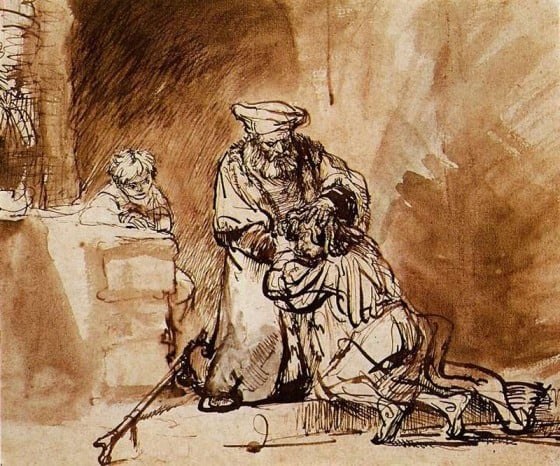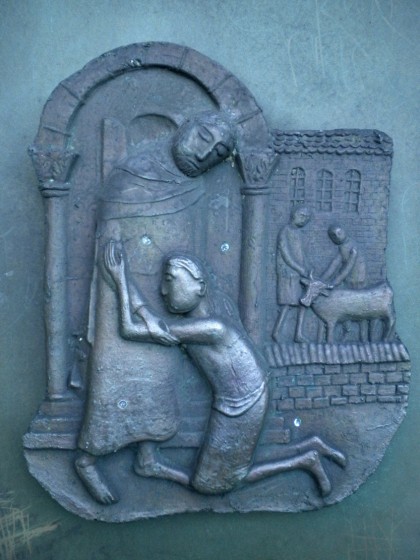 We could call this the Year of the Prodigal.
We could call this the Year of the Prodigal.
Those high-flyers, Donald Trump and Bernie Sanders, have each played outside the rules of the political establishment, and they are each enjoying a feast that makes the establishment mad as hops.
The outraged howls – unqualified nose-thumbers, ego-driven mavericks, not-ready-for-prime-time power– are heard, but not as loudly or insistently as the noise of the cheering throngs who are ready to help them feast.
It’s likely all of us are aghast at one of them. So we’ve all got our elder brother robes on. But it’s also likely that all of us admire one of them, and are willing to overlook the rules in favor of the delight we feel in their presence.
So: if we are enjoying the feast, who are we? Are we the folks who’ve lost something because the rules weren’t followed, and who are forgiving them because they bring us joy? Or are we the party animals who egged them on in the first place, long ago, when they were just starting out as daredevils?
Every neighborhood, every school, and yes, every family, has produced a prodigal of some kind. Not all of them are famous.
Some are infamous. The fellow who just got out of jail last week, and has moved back in with his mother.
Some just make you roll your eyes. The young woman who’s saddles her mother with a second ‘accidental’ child.
And some the family manages to keep on the downlow – the daughter in rehab, the son who can’t keep a job. They haven’t squandered big money, but they’ve squandered their youth, and chances they had to make something of themselves. Or, the spouse who has maxed out the charge cards, who has used shopping as a stress med. Now the couple works extra jobs on what were supposed to be days off, passing with the neighbors as hard-workers.
What about the white-collar ladder-climbers? The ones who play in the corporate roulette world – who’ve sold enough stocks to make a six-figure income, feasting all along the way, then get caught for insider-trading. What about the journalist who went back to a war zone, needing the adrenalin high?
And what about the ones who do none of this at all – but cherish their bitterness toward an ex who was unfaithful, toward a child who didn’t measure up, toward an old friend who mis-stepped. They seem the opposite of prodigal, they do not squander, they are misers hoarding their hurts, tight with their goodwill. Yet, isn’t that another kind of prodigality? Haven’t they squandered the love they once had, preferring to wallow in offenses taken rather than risk forgiveness?
The thing is, none of our prodigals got into their messes alone. Haven’t we all helped someone to Just have one more before you go. Or: I’d never forgive him, never. Or: Don’t worry about what people say, go for it. Or: That’s a big salary. I’m really proud of you, son. Or: Go ahead, treat yourself. It’s only money.
Jesus tells us that the prodigal son took his inheritance and squandered it – all of it – on things for which he needed companions. Loose living, is the rubric. And most of us hear excess, addiction, and chasing after good times. Because these good times were not found at home, because we were hungry for more than we had, or because we were unable to change the misery we felt without an artificial substance. Perhaps, because the necessary un-bonding between children and parents came before we had good judgment.
It’s hard to make a satisfying life. But it isn’t hard to make rules, especially for other people.
Downton Abbey, that manor of luxury which runs by strict rules, is a place where all its inhabitants have been miserable sometime. Rules are funny things. They are supposed to keep you safe and promote your goodness. At times they do. And at other times, they destroy your happiness and entrap you.
 We all have to find our way within the rules and we all have to find our time to break the rules.
We all have to find our way within the rules and we all have to find our time to break the rules.
That’s what the father of the prodigal son seems to know – that love and happiness are worth breaking rules to find; that one brother cannot replace another; nor can love between them be required simply because they are family.
Hillary Clinton has stopped yelling. And Marco Rubio has started yelling. Both are hoping the change they are making in themselves will help them find their way into our embrace.
Meanwhile, messages are being sent across the country, flying between the states from each primary, each caucus, messages about what we think of all these rules, and of the politicians who have emerged inside them and those who are outside in the road with the rest of us.
Theologian Paul Tillich wrote in the margin of his Bible, next to the parable of the prodigal son, this comment: When the prodigal came home, I hope he didn’t stay too long.
It’s hard to have a prodigal in the house for very long. They keep us on the edge of our seats, and that’s an uncomfortable way to live in the long run. If they do stay, they are in danger of losing their spunk and their high spirit, the very things we love so much in them. Yet, if the prodigal within us, within our hearts and minds, does not stay, we are in danger of becoming so much less than fully human.
_________________________________________________________________
Images:
1. Prodigal Son. Ink Drawing by Rembrandt van Rijn. 1609-1669. Vanderbilt Divinity School Library, Art in the Christian Tradition.
2. Prodigal Son. Galway Cathedral, Galway, Ireland. Stone carving. Vanderbilt Divinity School Library, Art in the Christian Tradition.










